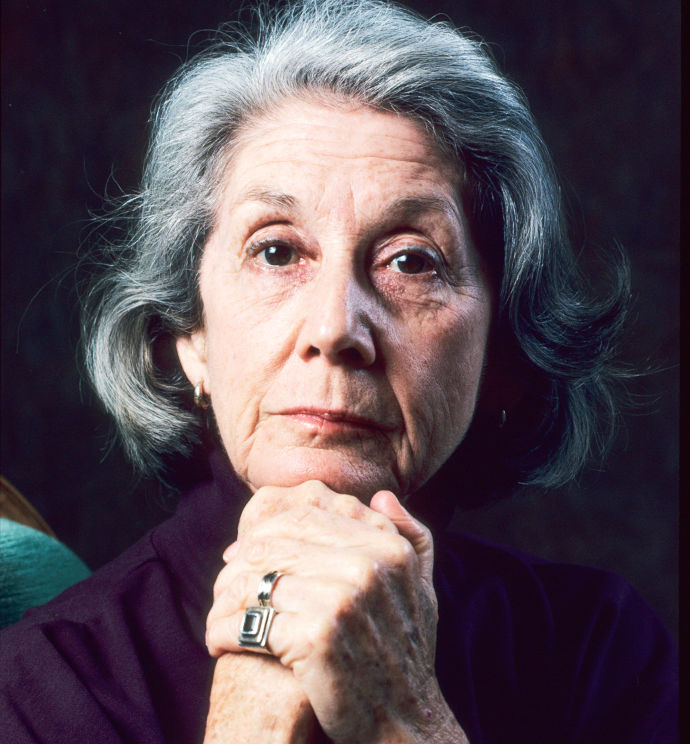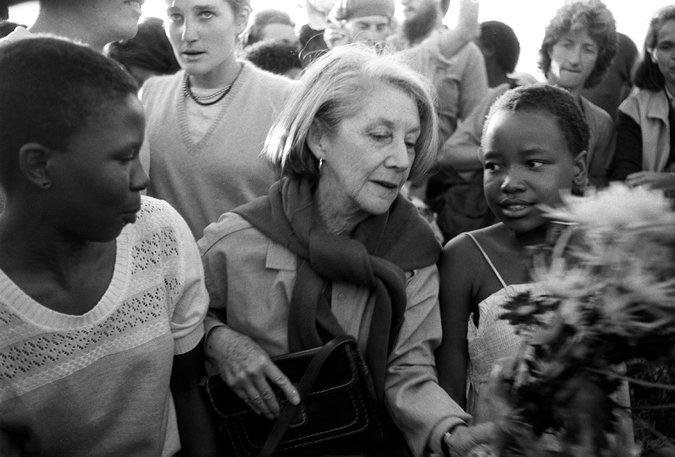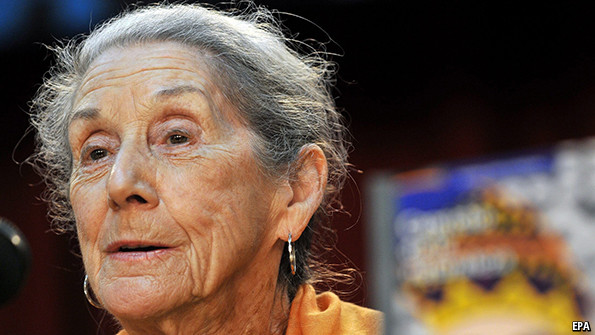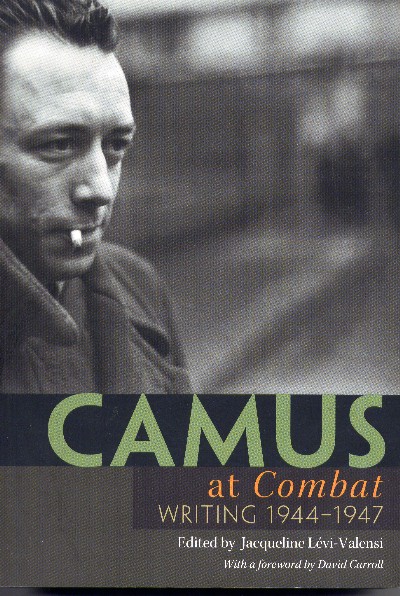 |
My hero: Nadine Gordimer by
Gillian Slovo JM Coetzee As a writer
and as a human being, Nadine Gordimer responded with exemplary courage
and
creative energy to the great challenge of her times, the system of
apartheid
unjustly and heartlessly imposed on the South African people. Looking
to the
great realist novelists of the 19th century as models, she produced a
body of
work in which the South Africa of the late 20th century is indelibly
recorded
for all time. She liked to say that nothing is as true as her fiction; it is certainly true that her fiction shone an unwavering light on the human suffering of apartheid. Bà thích nói, chẳng có gì thực hơn là
giả tưởng của tôi.  On Monday
morning, news came that Nadine Gordimer, who won the 1991 Nobel Prize
in
Literature, died Sunday, in Johannesburg. She was ninety years old.
Over the
decades, Gordimer wrote dozens of pieces for The New Yorker. Her first,
a short
story called “A Watcher of the Dead,” was published in 1951. After
that, she
continued to publish stories about life in South Africa, with
occasional
excursions into other genres. In 1954, she published a memoir of her
childhood,
called “Allusions in a Landscape”; in 1995, she wrote about being a
juror at
Cannes; and, in 2001, she recalled, in a short, pensive meditation on
memory,
running into an old friend on a London street. But it was
through her short fiction that Gordimer made her presence felt the
most, and
two of her short stories in our archive are available for anybody to
read. Both
happen to be about secrets revealed. “The First Sense,” from 2006, is
about a
woman who discovers that her husband, a cellist, is having an affair.
(She
works in an office; the affair is one more way in which his life is
more
exciting than hers.) “A Beneficiary,” from 2007, is about a daughter
who
discovers a family secret in her mother’s old papers. It poses a
question that
Gordimer asked in many of her stories: “How do you recognize something
that is
not in the known vocabulary of your emotions? … What do you do with
something
you’ve been told? Something that now is there in the gut of your
existence.”
It’s a theme Gordimer returned to again and again: the challenge of
responding
to the hardest facts of life. These
stories, and others by Nadine Gordimer, are available in our online
archive. Photograph
by Ulf Andersen/Getty. (1) Nghệ thuật giả tưởng Nadine Gordimer trả lời The Paris Review INTERVIEWER Chuyến đi
Anh là tìm về nguồn? Ui chao đọc,
thì liên tưởng 1 phát tới phận Gấu, cũng 1 tên Bắc Kít, cũng trở về sau
hơn nửa
thế kỷ, nhưng may mắn hơn, khác hẳn Gordimer, Gấu, lúc về thì đã có tới
hai quê
hương “thật” rồi, Nam Kít và Canada! Nadine
Gordimer, nhà văn Nam Phi đầu tiên, một trong số bẩy phụ nữ được Nobel
văn chương,
mất ngày 14 tháng Bẩy, 2014, thọ 90 tuổi. Seamus Heany, một đồng nghiệp
Nobel,
gọi bà là một trong số những “du kích lớn lao của tưởng tượng”. Con số
trên hai
chục tác phẩm [giả tưởng- tiểu thuyết, truyện ngắn] của bà, thường
xuyên
nêu lên hoàn
cảnh chính trị đa đoan, rắc rối và nhiều khi đau nhức, của mảnh đất quê
hương của
bà. Cuốn đầu, một tuyển tập truyện ngắn “Mặt nhìn Mặt”,"Face to
Face", được xb năm
1949, đúng
1 năm sau khi Nam Phi thành lập chính quyền phân biệt chủng tộc, và bà
được Nobel
năm 1991, cũng đúng 1 năm, sau khi chế độ này chấm dứt. Nghệ thuật giả tưởng Nadine Gordimer trả lời The Paris Review Nadine
Gordimer, nhà văn Nam Phi đầu tiên, một trong số bẩy phụ nữ được Nobel
văn chương,
mất ngày 14 tháng Bẩy, 2014, thọ 90 tuổi. Seamus Heany, một đồng nghiệp
Nobel,
gọi bà là một trong số những “du kích lớn lao của tưởng tượng”. Con số
trên hai
chục tác phẩm [giả tưởng- tiểu thuyết, truyện ngắn] của bà, thường
xuyên
nêu lên hoàn
cảnh chính trị đa đoan, rắc rối và nhiều khi đau nhức, của mảnh đất quê
hương của
bà. Cuốn đầu, một tuyển tập truyện ngắn “Mặt nhìn Mặt”,"Face to
Face", được xb năm
1949, đúng
1 năm sau khi Nam Phi thành lập chính quyền phân biệt chủng tộc, và bà
được Nobel
năm 1991, cũng đúng 1 năm, sau khi chế độ này chấm dứt. Obituary Nadine Gordimer Nadine
Gordimer, a South African writer and anti-apartheid advocate, died on
July
13th, aged 90 SHE had a
way of looking
at you. Even in Stockholm, in demure navy Armani, sitting on the king’s
right
at the banquet for her Nobel prize in 1991, she looked beady. Like a
bird, a
starling perhaps. Or a puffback from the South African veld, with its
loose
grey feathers and eyes of flint. Born in a
small mining
town east of Johannesburg after the Boer war, Nadine Gordimer was a
child of
empire. But there was no king and country on which to hang the family
dreams,
only South Africa. Her father, sent away from Latvia as a young
teenager by a
family that feared anti-Semitic pogroms, was ashamed of being poorly
educated.
Her middle-class English mother fretted that she had married beneath
her. Ms
Gordimer was kept at home from the age of ten, ostensibly because of a
heart
condition, but really so that her mother could call out the family
doctor, for
whom she had a weakness. Thus Ms
Gordimer’s home
life, oppressed by secrets and unspoken longings, and made liveable
only by
what she called “a certain dour
tact”, was lonely. Books became her friends. Chekhov and Dostoyevsky
taught her
the idiosyncrasies of human behaviour, Rilke filled the emptiness that
religious faith could not. Proust showed her that sexual longing, so
central to
adolescent dreams, can be as cruel as it is blissful. Yeats taught her
about
passion for justice. They all helped her make up her own mind, and
unlike many
South Africans at the time, she saw what she was looking at. Even before
the National
Party passed its apartheid laws in 1948, blacks and whites were treated
differently. That black miners pointed to items they wanted to buy from
behind
a grille, whereas she and her mother could go into a shop and try on 15
dresses, was something she never forgot. In her 20s she moved to
Johannesburg,
where she spent a year at the University of the Witwatersrand, long
enough to
make friends with blacks and with Bram Fischer (the model for the hero
of
“Burger’s Daughter”) and George Bizos, two lawyers who represented
Nelson
Mandela at the Rivonia trial where he was sentenced to life
imprisonment in
1964. Mandela became a lifelong friend: she helped edit the famous
speech that
opened his defence; he read her work in jail; and when they met again
after his
release he spoke, not of her writing or his years on Robben Island, but
of the
discovery that his wife, Winnie, had been unfaithful while he was
imprisoned. In
Johannesburg she also
discovered the intellectual energy of bohemian, black Sophiatown and,
soon
after, the freedom of being newly divorced. Sexual liberation,
especially for
women, would be a central theme of her work. She had been publishing
short
stories since she was 15 and was not yet 30 when her first novel, “The
Lying
Days”, appeared. In another
time and
another place Ms Gordimer might not have become a political writer. But
she
wrote of life around her, and the life around her was racist. Fiction,
reading
it and writing it, became synonymous with seeking truth. In 1953 the New
York Times compared “The Lying Days” with Alan Paton’s “Cry, the
Beloved
Country”, which had come out five years before, and said that her book
was “the
longer, the richer, intellectually the more exciting”. Ms
Gordimer’s first story
for the New Yorker in 1954 began the relationship that led to
her renown
outside South Africa. “Allusions in a Landscape” is a mordant tale
about a
white suburban housewife and a wacher, a Jewish watcher-over of
the
dead. There are no blacks in it, which is strange but also in a way
symbolic.
Her novels and short stories about apartheid made her famous, but her
writer’s
eye was more ambitious and far subtler than that. She could
see her way
into the lives of men and women, black and white, beyond South Africa’s
borders
to other, independent African countries; even into a post-apartheid
South
Africa when such an idea was still unthinkable for many. Seamus Heaney
called
her one of “the guerrillas of the imagination.” “The Conservationist”
won the
Booker prize in 1974. “The Lying
Days”, written
in the first person and with no plot or denouement, would hardly have
been
regarded as a novel 70 years ago, except by fans of James Joyce and
Virginia
Woolf. And yet the journey that Helen Shaw, the young white heroine,
takes into
the hovels of poor Johannesburg displays “the whole panorama of this
explosive
continent’s most explosive corner”, wrote one reviewer. Freedom
writer The arrest
of her best
friend, Bettie du Toit, and the Sharpeville massacre in 1960 sharpened
her
political courage. She joined the then-illegal African National
Congress (ANC),
and for a while she and her second husband sheltered the ANC’s
president, Albert
Luthuli, Africa’s first Nobel laureate. Three of her books were banned.
She
spoke out fiercely against censorship, both before and after apartheid
ended,
and helped found the Congress of South African Writers, to which she
gave part
of her own Nobel prize money. Prospero Guerrilla of
the imagination
Jul 15th 2014,
12:51 by E.W. NADINE
GORDIMER, the first South African and only the seventh woman to win the
Nobel
Prize for Literature, died on July 14th at the age of 90. Seamus
Heaney, a
fellow Nobel laureate, called her one of the great “guerrillas of the
imagination”. In over two dozen works of fiction, she frequently
addressed the
complex and often tormented political situation of her native land. Her
first
book, a collection of short stories called "Face to Face", was
published in 1949, just a year after the South African government
instituted
the system of apartheid. She won her Nobel Prize in 1991, the year that
system
was finally brought to an end. Along with
writers such as Alan Paton and J.M. Coetzee, hers was one of the voices
that
brought an awareness of the injustices of South African politics to the
wider
world—and her work suffered because of it. "A World of Strangers"
(1958) was banned for 12 years in her native country; "The Late
Bourgeois
World" (1966) was banned for 10 years. "Burger’s Daughter"
(1979) was also banned, but only briefly, for by that point Ms Gordimer
was an
author with a worldwide reputation. But it was not just under apartheid
that
her work was threatened: in 2001, a decade after the end of apartheid,
her 1981
novel, "July’s People"—set in a future, apocalyptic South Africa
where racial tension has erupted into full-blown civil war—was
recommended for
removal from the school curriculum in Gauteng, South Africa’s
wealthiest
province. The criticism leveled at the book was that the author did not
distance
herself strongly enough from the racism explored in the novel.
("Hamlet" was also recommended for removal because it was “not
optimistic or uplifting”.) In the end, however, the ban was not upheld. And yet in
many respects Ms Gordimer—who as a girl longed to be a ballet dancer, a
dream
destroyed because her overbearing mother believed her daughter’s health
would
suffer—never saw herself as a political writer. Her father was a Jewish
watchmaker who had come to South Africa from Lithuania as a boy; her
parents’
marriage was unhappy and she was largely self-schooled, a girl who
found
herself in books. “I would have been a writer anyway,” she told the
Paris
Review in 1983. “I was writing before politics impinged itself upon my
consciousness. In my writing, politics comes through in a didactic
fashion very
rarely…The real influence of politics on my writing is the influence of
politics on people. Their lives, and I believe their very
personalities, are
changed by the extreme political circumstances one lives under in South
Africa.” The strength
of her fiction lay in the way a social and political landscape was
expressed
through such a wide variety of characters: characters both white and
black,
characters from very different economic circumstances. The breadth of
her
imagination, and her willingness to create characters from all walks of
life,
brought criticism from those who would wish a writer of her stature to
follow a
cleanly political agenda. She answered those critics in her Nobel
lecture. “The
writer sometimes must risk both the state’s indictment of treason, and
the
liberation forces’ complaint of lack of blind commitment,” she said.
“As a
human being, no writer can stoop to the lie of Manichean ‘balance’.” In her last
book, "No Time Like the Present" (2012), her characters struggle with
the “new” South Africa, with rising crime and an inadequate education
system:
in 2006 Ms Gordimer herself became the victim of an attack, when
thieves broke
into her Johannesburg house. In her later years she lent her voice to
the
HIV/AIDS movement, campaigning for treatment for sufferers; and she
criticised
the ANC under its current leader, Jacob Zuma, expressing her opposition
to a
proposed law that would limit the publication of information deemed
“sensitive”
by the government. “The reintroduction of censorship is unthinkable
when you
think how people suffered to get rid of censorship in all its forms,”
she said
last month. But finally,
as she saw it, a writer’s task was both simple and infinitely complex:
“What a
writer does is try to make sense of life,” she said. That was something
she
always did. TV sẽ đi liền
1 đường dịch thuật.  Nadine
Gordimer, Novelist Who Took On Apartheid, Is Dead at 90 Gordimer @ TV Trong
cả ba nhà văn nổi tiếng nổi lên từ Nam Phi, chẳng có ai học xong trung
học, cả
ba đều tự học tới chỉ, và trở thành những nhà trí thức đến tận lỗ chân
lông. Điều
này cho thấy, sự quyết tâm, của những người trẻ tuổi ở mép bờ của đế
quốc, bởi
vì họ tin rằng chỉ có cách đó, mới có được cuộc sống mà họ thèm khát:
cuộc sống
của trí tưởng. (a) The function
of the writer is to act in such way that nobody can be ignorant of the
world and
that nobody may say that he is innocent of what is all about. Coetzee
trích dẫn trong bài viết về Gordimer [nhà văn Nam Phi được Nobel trước
ông],
trên tờ Điểm Sách Nữu Ước, NYRB,
số đề ngày Oct 23, 2003 In his 1988 book of essays,
“Prepared for the Worst,” Christopher
Hitchens recalled a bit of advice given to him by the South African
Nobel
Laureate Nadine Gordimer. “A serious person should try to write
posthumously,”
Hitchens said, going on to explain: “By that I took her to mean that
one should
compose as if the usual constraints—of fashion, commerce,
self-censorship,
public and, perhaps especially, intellectual opinion—did not operate.”
Hitchens’s untimely death last year, at the age of sixty-two, has
thrown this
remark into relief, pressing upon those of us who persist in writing
the
uncomfortable truth that anything we’re working on has the potential to
be
published posthumously; that death might not be far off, and that,
given this
disturbing reality, we might pay attention to it. Bài viết này quả là thần sầu!
Gấu mê quá, tính dịch hoài, rồi lại
lu bu, quên mất. Bây giờ thì lại nhớ ra, là,
Hannah Arendt cũng đã từng phán, tương
tự như Gordimer, về Walter Benjamin. Danh vọng "muộn" (posthume) - sau khi đã xuống lỗ - ít được người đời ham chuộng, tuy đây là thứ vững vàng nhất. Thứ hàng (nhà văn) có lời nhất, thì đã chết, và do đó, không phải là đồ "lạc xoong" (for sale). Trong vài món hiếm muộn, phi-thương, phi-lợi (uncommercial and unprofitable), có Walter Benjamin. (b)
This
is the text of a paper delivered at the Conference on ' Writings from
Africa: Concern and Evocation', held by the South African Indian
Teachers' Association in Non-fiction - Camus at
"Combat": Writing 1944-1947 by Albert Camus, edited by
Jacqueline Levi-Valensi (
|

